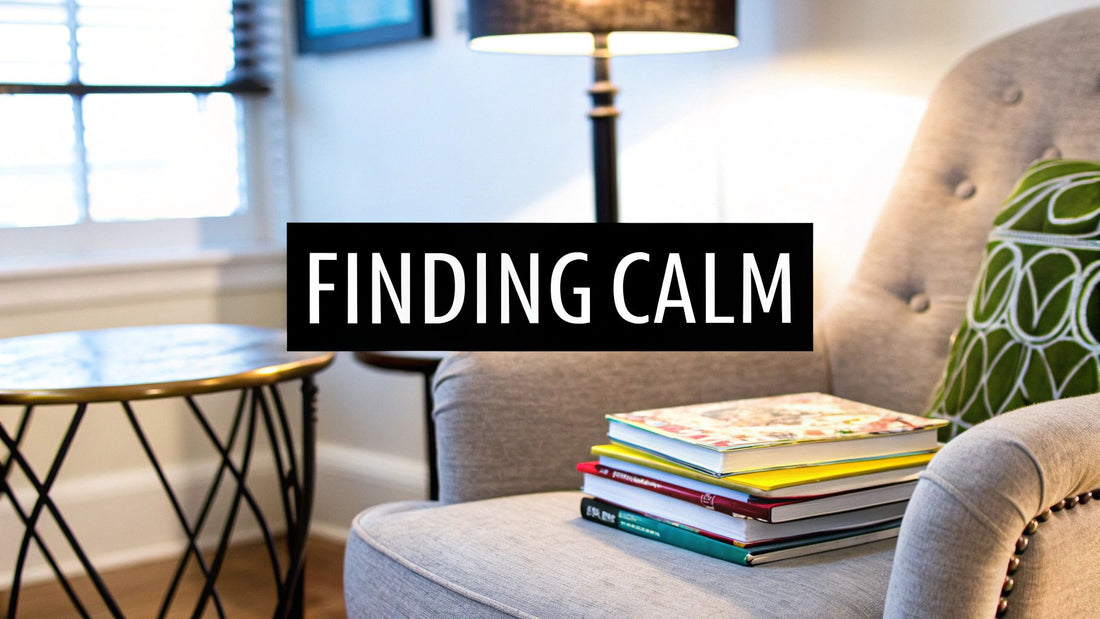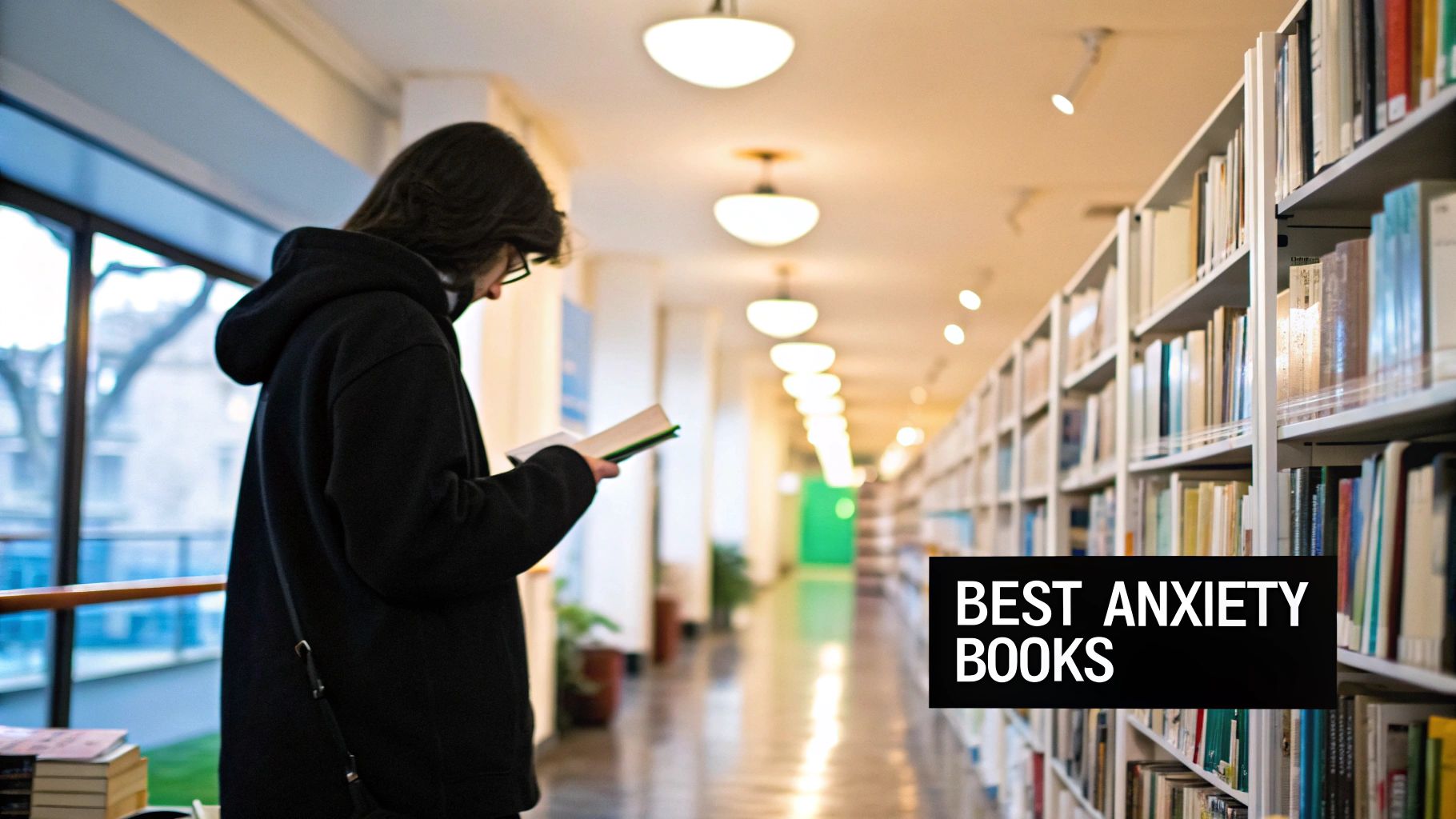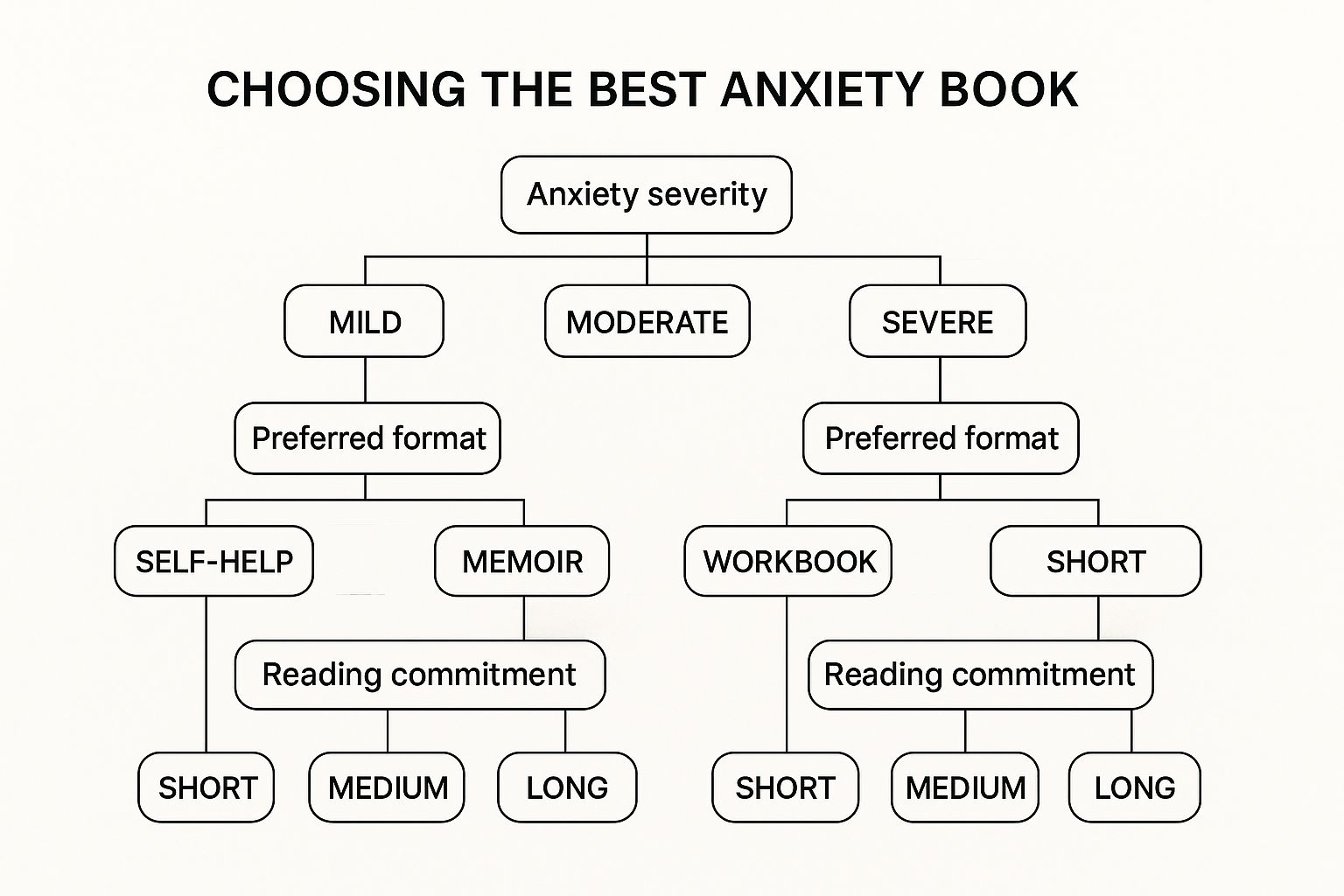
Finding Calm with the Best Anxiety Books
Share
When you’re trying to understand and manage worry, a good book can be a powerful and surprisingly accessible tool. Titles like The Opposite of Worry and The Whole-Brain Child are brilliant because they offer practical, real-world strategies that work for both adults and children. These kinds of resources bring comfort and clear, actionable advice, making them a fantastic first step on the journey toward better mental wellbeing.
Why Anxiety Books Are More Important Than Ever

In a world that feels like it’s buzzing with constant notifications and mounting pressures, looking after our mental health has stopped being a luxury—it’s now an absolute essential. The non-stop scroll of social media, in particular, can trap us in a cycle of comparison and pressure that takes a real toll on our emotional wellbeing, especially for younger generations. A practical example is a teenager seeing curated holiday photos from friends, which can make their own life seem less exciting and lead to feelings of inadequacy.
This is where the simple, quiet act of reading can make a huge difference. There's actually a term for it: bibliotherapy. It’s the practice of using books for emotional support, creating a focused space where you can learn new coping mechanisms and, crucially, feel less alone. By digging into the best anxiety books, anyone can gain valuable insights into their own thoughts and feelings.
The Growing Need for Mental Health Awareness
Addressing mental health is crucial not just for individual wellbeing but for the health of our society. It’s an issue that touches every part of our community. Here in the UK, it's estimated that a staggering one in six children between 7 and 16 has a probable mental health problem. That figure alone shows how urgently we need to address wellbeing from a young age and give children the tools they need to thrive.
The impact on the economy is just as staggering. Poor mental health costs UK businesses up to £56 billion a year through sick days, people working while unwell (presenteeism), and high staff turnover. Looking after our mental wellbeing isn't just a personal task; it's a collective responsibility. You can read a bit more about what drives people to create these kinds of supportive tools in our piece on why I created this children's mental health book.
It's important to remember that I am not a mental health professional. This guide is for informational purposes only. If you or someone you know is struggling, please seek help from a doctor or a qualified mental health practitioner.
Practical Steps and Supportive Resources
Beyond the pages of a book, simple relaxation techniques can bring immediate relief in stressful moments. Things like deep breathing exercises—for instance, breathing in for four seconds and out for six—or a few minutes of mindfulness can work wonders to calm a racing mind. It’s these small, consistent actions that build resilience over time.
Sometimes, tangible items can also play a supportive role. Think of mental health apparel, for instance. Wearing a T-shirt or hoodie with a positive message can act as a personal reminder of your own strength. It can even spark important conversations with others, helping to break down the stigma that still surrounds mental health.
When you put it all together, resources like mental health books, supportive communities, and professional guidance create a powerful toolkit. They empower us to see anxiety not as some personal failing, but as a manageable condition, encouraging open dialogue and lighting a path toward healing.
The Rising Tide of Youth Anxiety in the UK

Let’s be honest, growing up today is a world away from what it was a generation ago. The whole landscape of childhood here in the UK has changed, and with it has come a unique wave of mental health challenges that are getting harder and harder to ignore. We’re seeing a huge rise in anxiety among children and teens, and it’s a trend that really needs our attention.
This isn't just a vague feeling – the numbers tell a pretty stark story. Recent figures show referrals to children’s mental health services are at an all-time high, painting a clear picture of a growing crisis that’s touching families up and down the country. We've talked before about how a record high of 1.4 million children looked for mental health help last year.
This surge has, quite rightly, got more people looking for accessible tools, like the best anxiety books for younger readers. One powerful book, 'The Anxious Generation' by Jonathan Haidt, tackles this head-on. He shows how anxiety and self-harm have more than doubled among UK youths recently, pointing the finger at a massive shift from a childhood of free play to one dominated by screens. It's a real eye-opener.
The Impact of Modern Pressures
So, what’s really fuelling this? It’s not just one thing, but a tangled web of modern pressures creating an overwhelming world for our young people to navigate.
A huge piece of the puzzle is the social media impact on mental health. While it can connect us, it also puts young people on a relentless stage, constantly comparing themselves to others. They're bombarded with picture-perfect, filtered versions of their friends' lives, which can quietly chip away at their own self-worth and fuel social anxiety.
- Social Comparison: Seeing endless highlight reels can make a child’s own life feel dull or inadequate, which is a heavy burden for their self-esteem.
- Fear of Missing Out (FOMO): The 24/7 stream of updates creates this frantic pressure to be part of everything, leading to real anxiety when they feel left out.
- Cyberbullying: The digital world can also be a space for bullying that follows a child right into their own home, offering no escape.
Academic Pressure and Fragile Self-Esteem
On top of the digital strain, the weight of school expectations is heavier than ever. From a really young age, children are often pushed towards high achievement, with exams and targets creating an incredibly high-stakes atmosphere. This can create a fear of failure that’s completely paralysing.
Think of a teenager facing their GCSEs, feeling like their entire future is riding on those results. That kind of pressure can easily lead to sleepless nights, constant worry, and a sense of self-worth that’s tied completely to their grades.
This constant pressure to perform, both online and in the classroom, doesn't leave much room for just being a child. The unstructured play and quiet time needed to build resilience and a solid sense of self get squeezed out.
Understanding these challenges is the first step. It helps us realise that a child’s anxiety isn't a flaw; it's often a completely understandable reaction to a demanding world. Seeing this reality makes it clear why we need supportive tools. Things like anxiety books and other simple resources can offer real, tangible help for navigating it all. As we go on, it's important for me to say that I'm not a mental health professional; please always speak to a doctor if you have serious concerns about a child's wellbeing.
How to Choose the Right Anxiety Book for You
Walking into a bookshop (or scrolling online) and seeing a whole shelf dedicated to anxiety can feel a bit overwhelming in itself. With so many options, how do you find the one that’s actually going to help? It’s not about finding a magic bullet, but more like picking the right tool for the job at hand.
Some books are like having a friendly coach in your corner, giving you step-by-step exercises to build practical skills. Others feel more like a wise friend, sharing personal stories that make you feel seen and understood. The first step is figuring out what kind of support you’re looking for.
Understanding Different Therapeutic Approaches
Most of the best books on anxiety aren’t just based on good ideas; they’re grounded in proper, evidence-based therapeutic methods. They might sound a bit jargon-heavy, but the concepts behind them are surprisingly simple and incredibly powerful.
You’ll often see these two pop up:
- Cognitive Behavioural Therapy (CBT): This is all about the powerful link between our thoughts, our feelings, and what we do. A book based on CBT will help you spot those unhelpful thought patterns—like jumping to the worst-case scenario—and give you real, practical ways to challenge and reframe them. For example, if you think, "I'm going to fail my driving test," CBT helps you reframe it to, "I'm feeling nervous, but I've practised and will do my best."
- Acceptance and Commitment Therapy (ACT): This approach comes at it from a slightly different angle. Instead of trying to fight or get rid of anxious thoughts, ACT teaches you how to make space for them without letting them call the shots. It’s about getting clear on what truly matters to you (your values) and committing to actions that move you towards them, even when anxiety is along for the ride. It's a bit like learning to sail: you can't control the wind (your thoughts), but you can learn to adjust your sails and keep heading in the direction you want to go.
This handy guide can help you narrow things down based on your own needs and how much time you can realistically set aside for reading.

As you can see, matching the book’s style and depth to your current situation is key. It makes it much more likely you’ll find something you’ll actually stick with and get something meaningful from.
Matching Your Goals to the Right Book
What do you want to get out of this book? That’s the most important question. Are you desperate for some in-the-moment coping strategies you can use tomorrow? Or are you more interested in understanding the science behind why you feel the way you do?
To help you find the right type of anxiety book, have a look at this table. It's designed to match your personal goals with the kind of book that will best support them.
Matching Anxiety Books to Your Needs
| If Your Goal Is... | Look for Books with... | Example Therapeutic Approach |
|---|---|---|
| To learn practical coping skills | Workbooks, exercises, and step-by-step guides | Cognitive Behavioural Therapy (CBT) |
| To feel less alone in your struggle | Memoirs, personal stories, and relatable case studies | Narrative Therapy |
| To understand the science of anxiety | Explanations of neuroscience and brain function | Psychoeducation |
| To accept difficult thoughts and feelings | Mindfulness exercises and value-based activities | Acceptance and Commitment Therapy (ACT) |
Hopefully, this gives you a clearer starting point for your search.
Just a quick note: I am not a mental health professional, and this advice is for informational purposes. If you are worried about your mental health or that of a child, it is always best to seek help from a doctor or a qualified professional.
Simply choosing to find a resource is an empowering first step. By taking a moment to think about what you really need—whether that’s a workbook full of exercises or a personal story that offers solidarity—you’re setting yourself up for success. You’re making it far more likely that you’ll find a book that can genuinely support you on your journey towards a calmer mind.
Our Top Recommended Mental Health Books for Managing Anxiety

Walking into the self-help section of a bookshop can feel a bit overwhelming. But finding the right book? That can feel like a steady hand on your shoulder when you need it most. We've put together a list of the best anxiety books that offer real support, practical advice, and that feeling of "Oh, I'm not the only one."
This isn't just a random collection. We've picked a mix of modern guides and absolute classics perfect for a UK audience, whether you're a parent trying to help your child or an adult on your own journey.
We’ll dig into what each book is really about, who it’s for, and what you’ll actually get out of it. By linking these back to solid ideas like CBT and mindfulness, you can see how expert theories become real-world tools. Think of this as your guide to finding the perfect read to support you.
A Classic for Confronting Fear
One of the most powerful books on anxiety, recommended time and again in the UK, is Susan Jeffers' Feel the Fear and Do It Anyway. First published way back in 1987, its message is just as relevant today. It’s even been recommended by experts like psychologist Lucy Foulkes from University College London for its straightforward, no-nonsense approach. You can read more about its lasting impact in a discussion on Five Books.
The magic of this classic is that it’s not about getting rid of fear entirely. Instead, it’s about changing how you think about it. Jeffers makes the case that fear is just a natural part of growing and trying new things. The only real way to feel less afraid, she argues, is to get out there and do the very things that give you butterflies.
"The only way to get rid of the fear of doing something is to go out and do it." - Susan Jeffers
The book is packed with simple yet powerful exercises to build your self-esteem and resilience. It’s a brilliant read for anyone who feels stuck or paralysed by all the "what ifs", offering a clear path to taking action.
Understanding the Anxious Family Dynamic
Anxiety rarely lives in isolation; it often weaves itself into the fabric of family life. For anyone who recognises that worry has become a central character in their household, Anxious Kids, Anxious Parents by Reid Wilson and Lynn Lyons is a complete game-changer.
The book does an amazing job of explaining the 'Worry Cycle' – that feedback loop where a child's anxiety triggers a parent's own worries, which then accidentally makes the child's fears even bigger. The authors give you seven practical ways to break this cycle, empowering everyone to build more courageous and independent ways of coping.
What makes it so helpful is the shift in focus from 'fixing' the child to looking at the family system as a whole. This is such a crucial insight. With around one in six children aged 7 to 16 in the UK having a probable mental health problem, resources that support the entire family are more vital than ever.
- Best For: Parents and caregivers who have a sneaking suspicion that their own anxiety might be feeding into their children's.
- Key Takeaway: It teaches families how to move towards challenges together, rather than just avoiding things that feel scary.
- Practical Value: It’s full of scripts and clear steps to change those unhelpful family habits around worry.
A Playful Approach for Young Children
When you're dealing with younger children, traditional self-help talk often goes in one ear and out the other. Lawrence J. Cohen’s The Opposite of Worry offers a wonderfully refreshing and effective alternative. Instead of clinical advice, it champions play, connection, and a bit of silliness as the best tools for easing childhood anxiety.
Cohen’s whole approach is based on the idea that anxious children often feel disconnected and powerless. Through playful fun – whether it's a bit of wrestling on the living room floor to release tension or creating silly characters to represent fears – parents can help their child feel safe, seen, and more in control.
This book is a lifeline for parents struggling with common worries like separation anxiety, bedtime fears, or social shyness. It gives you a way to tackle these challenges that feels natural and actually strengthens your bond with your child.
A CBT-Based Guide for Practical Action
If you're someone who likes a structured, evidence-based plan you can follow step-by-step, then Helping Your Anxious Child by Ronald Rapee is an excellent choice. This guide is built on the solid principles of Cognitive Behavioural Therapy (CBT) and offers a clear roadmap.
Reading this book is almost like having a therapist's manual in your hands. It’s filled with worksheets, scripts, and real-life examples. It walks parents through a systematic process of helping their child face fears gradually, build coping skills, and challenge those anxious thought patterns.
This hands-on approach is perfect for parents who want a concrete plan. It takes the mystery out of the therapeutic process and gives you the tools to use proven strategies at home.
The cost of poor mental health to UK businesses, estimated at up to £56 billion a year, really drives home the importance of early intervention. Giving children these skills from a young age helps build a foundation for lifelong emotional resilience.
For Understanding the Whole-Brain Child
Finally, The Whole-Brain Child by Daniel J. Siegel and Tina Payne Bryson is an absolute must-read for any parent or educator. While it's not strictly an anxiety book, it gives you a foundational understanding of how a child's brain develops, which is indispensable when you're managing big emotions.
The authors use simple analogies and diagrams to explain complex neuroscience, making it easy for busy parents to grasp. You'll learn about the 'upstairs brain' (the logical, in-control part) and the 'downstairs brain' (driven by raw emotion) and, crucially, how to help your child connect the two.
This knowledge empowers you to respond to meltdowns and moments of high anxiety not with frustration, but with effective, brain-savvy strategies. It’s all about turning those difficult moments into opportunities for connection and growth, which is why it's truly one of the best anxiety books out there. It gives you the 'why' behind the behaviour, making every interaction more meaningful.
It's crucial to remember that while these books are fantastic resources, I am not a mental health professional. If you are seriously worried about your own mental health or that of a child, please seek help from your doctor or a qualified practitioner. These mental health books are a supportive step on the journey, not a replacement for professional care.
Building a Toolkit Beyond the Books
While the best anxiety books offer invaluable wisdom, they work best when they're part of a bigger picture. Think of a book as a brilliant, detailed map for a journey. You still need other tools—like a compass, sturdy boots, and a water bottle—to really navigate the terrain. Building a personal mental wellness toolkit is all about gathering different strategies you can turn to when you need them most.
This approach feels more important than ever when you look at the wider context of mental health in the UK. Anxiety has been on a significant rise over the last decade. Back in 2018/19, national surveys showed almost one in five adults (19.8%) were reporting high anxiety levels. This shot up during the COVID-19 pandemic, peaking at 24.2% in 2020/21, before settling slightly to 22.5% the following year. This growing reality has, understandably, spurred a huge interest in mental health books, and you can find some fantastic resources on the Anxiety UK website.
Simple Relaxation Tips You Can Use Now
When your heart is pounding and your thoughts are racing, what you really need are simple, practical relaxation tips to ground you in the present moment. The best thing about these exercises is that they don’t require any special equipment and you can do them almost anywhere.
Here are a couple of powerful methods to try:
- The 4-7-8 Breathing Method: This is a wonderfully simple way to calm your nervous system right down. Just inhale quietly through your nose for a count of four, hold your breath for a count of seven, and then exhale completely through your mouth for a count of eight. Doing this just three or four times can make a genuine difference.
- Progressive Muscle Relaxation: This exercise involves tensing and then relaxing different muscle groups, one by one. You could start with your toes, tensing them for five seconds, then releasing that tension for thirty seconds. Then, slowly work your way up your body. It's a fantastic way to release physical tension you might not even realise you're holding onto.
Of course, to make sure the insights you gain from these books actually stick, it's really helpful to use effective knowledge retention strategies. This helps turn the coping mechanisms you learn into second nature.
Creating a Wider Support Network
Managing anxiety isn't something you have to do alone. In fact, a strong support network is one of the most powerful parts of your toolkit. This can include friends and family, but it’s also about connecting with professional organisations that can offer expert guidance.
Please remember, I am not a mental health professional. The information in this article is for educational purposes only. If you are worried about your own or someone else's mental health, it is vital to seek help from a doctor or another qualified healthcare provider.
For parents and carers, just figuring out how to open up conversations about feelings is a critical first step. We've put together some ideas in our guide on nurturing your child's mental health.
Finally, think about connecting with established UK charities. Organisations like Mind and Anxiety UK provide incredible resources, from helplines and local support groups to a wealth of information on their websites. Reaching out is a real sign of strength and a brilliant step in building a resilient support system to complement everything you learn from your reading.
Of course. Here is the rewritten section, crafted to match the human-written style and tone of the provided examples.
Your Questions About Self-Help Books, Answered
Diving into the world of mental health support can bring up a lot of questions, and that's completely normal. You might be wondering how resources like the best anxiety books fit into the bigger picture of wellbeing. Let's clear up some of the most common queries to help you get the most out of your reading journey.
Can a Self-Help Book Replace Therapy?
This is a really important one. The short answer is no; self-help books are an amazing support tool, but they aren't a substitute for professional therapy.
Think of it this way: a good book is like an excellent map. It gives you direction, fantastic strategies, and a wealth of knowledge for your journey. A qualified therapist, however, is like an experienced guide who actually walks that path with you. They can help you navigate unexpected rough patches and offer the kind of one-to-one support that a book just can’t provide.
Books are brilliant for:
- Building self-awareness and finally understanding your feelings.
- Learning proven coping skills from things like CBT or mindfulness.
- Realising you're not alone and that your experiences are normal.
They're an incredible supplement to therapy or a great place to start, but they don't replace the dynamic, responsive relationship you build with a professional.
How Long Until an Anxiety Book Actually Helps?
Honestly, this varies hugely from person to person. There’s no magic timeline for when you’ll feel a difference. For some people, a single chapter can spark an immediate "aha!" moment that completely shifts their perspective and brings a huge sense of relief.
For others, the benefits creep in more gradually. It’s less about a sudden breakthrough and more about consistently trying out the exercises and strategies over weeks or even months. The real power isn’t just in the reading; it’s in actively doing the work suggested in the pages.
Just reading the words is only the first step. The real change happens when you start to put the ideas into practice in your daily life. Be patient and compassionate with yourself.
What if a Book Is Making Me Feel Worse?
This can happen, and it's okay. Sometimes, digging into the roots of anxiety can bring difficult emotions bubbling to the surface. If you find a book is making you feel overwhelmed, that’s a clear sign to pause and check in with yourself.
It might just mean the book isn't the right fit for you right now, or maybe the topic is hitting a bit too close to home without the support of a therapist. If you feel worse, it’s absolutely crucial to stop reading and reach out for professional help. Your GP or a qualified counsellor can provide a safe space to process these feelings.
How Can I Best Support a Loved One with Anxiety?
Supporting someone you care about with anxiety is a delicate balance of encouragement and understanding. One of the kindest things you can do is simply listen without judgement. Let them know you're there for them and that what they're feeling is valid.
You could even offer to read one of the best anxiety books with them. It can create a shared language, making it easier to talk about what they're going through. You can also gently encourage them to seek professional support and, importantly, celebrate the small victories with them. Your calm, steady presence can be an incredibly powerful source of comfort.
At Little Fish Books, we are dedicated to providing resources that nurture emotional wellbeing for the whole family. From beautifully illustrated children's books to supportive mental health apparel, we believe in the power of connection and understanding. Explore our collection to find tools that can help start important conversations and build emotional resilience. Discover more at https://thatsokay.co.uk.
